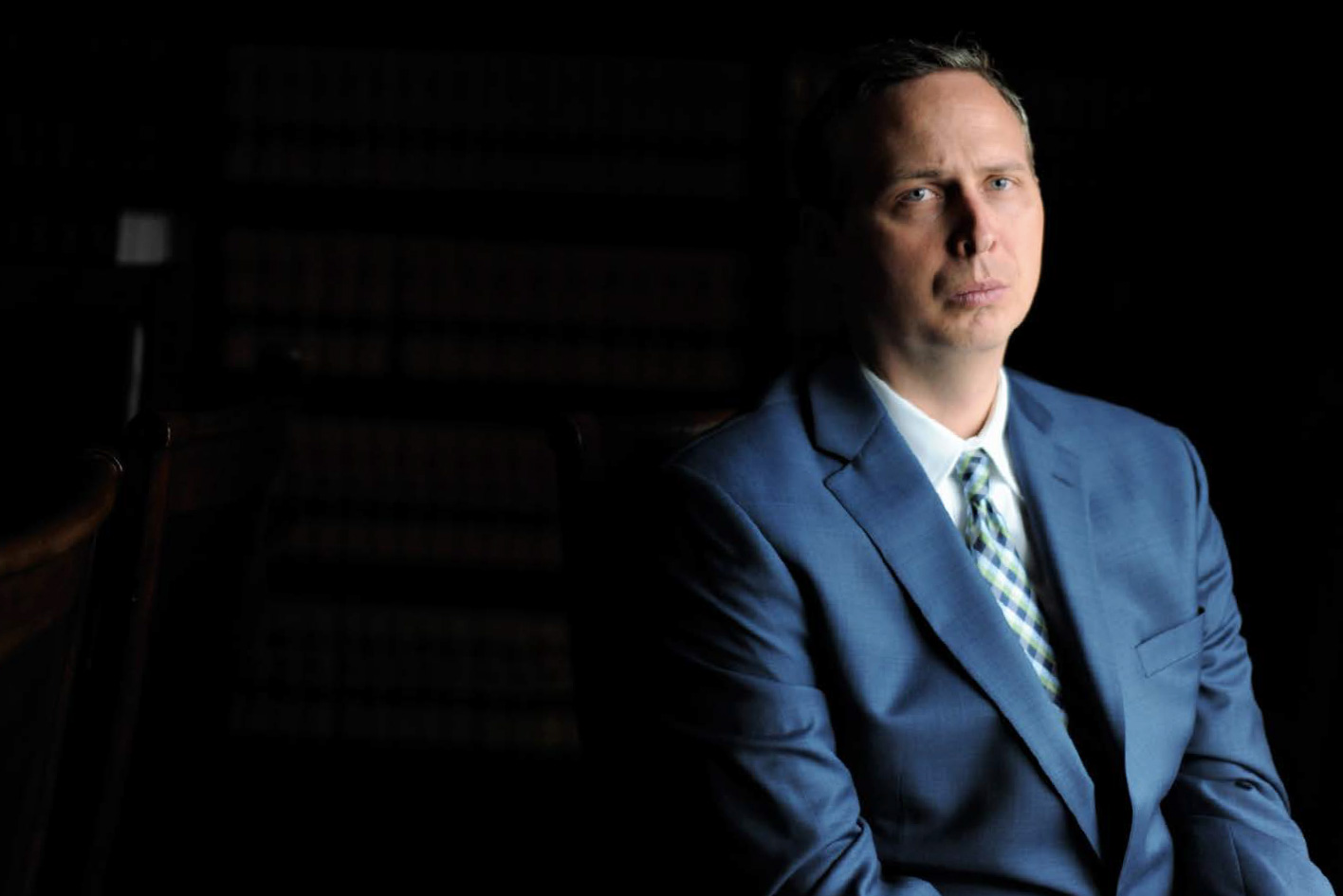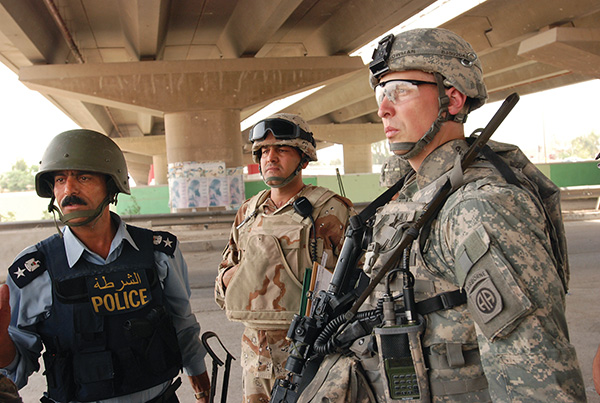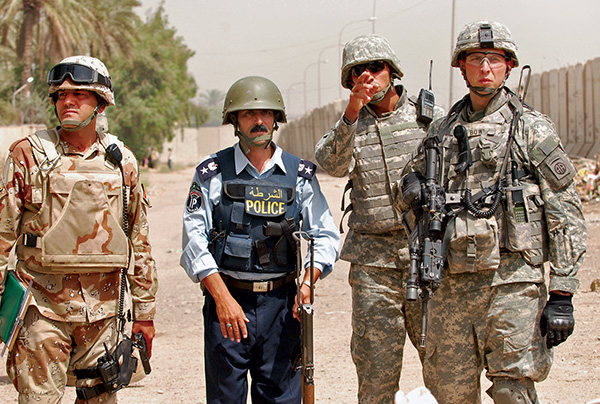God in the chaos: Reflections on Iraq and faith
The bullet left a small entry wound, but when the man was turned over, I realized he was missing a large part of the back of his head — an empty void where his hair, flesh, skull and brain should have been. The force of the bullet must have been terrific. I remember the blood that poured onto the concrete when he was pulled from the pickup truck. I knew my mind was unraveling when I sat and stared at the trail of blood long after he was carried away. I do not know why this particular murder affected me so deeply because I had seen much worse. After all, it was just another discarded body from the streets of Baghdad. I was a 23-year-old platoon leader far removed from Dayton.
It was 2007, and the level of sectarian bloodletting in Iraq was beyond crisis level. The killing between Shiite and Sunni factions was accentuated with bullets, car bombs and improvised explosive devices directed at American forces. Four years had passed since the initial invasion of Iraq, and the United States was struggling to hand over control of the country to the Iraqi government. The military response at the time was a “surge” of 20,000 soldiers. I was one of those soldiers, a paratrooper with the Second Brigade Combat Team of the 82nd Airborne Division.

Just a few months before, I was finishing my senior year at UD and completing the last steps to become a commissioned officer through our University’s Army R.O.T.C. program. I had entered the program a year after the attacks of Sept. 11, 2001. Like many, I remember that day well. I was a senior in high school. My teacher turned on our classroom television, and the reception alternated between wavy black-and-white images and fully scrambled dots. Although distorted, I recognized the Twin Towers engulfed in smoke and flames. For me and for many future soldiers, it was the day Graham Greene’s novel The Power and the Glory describes: There is always one moment in childhood when the door opens and lets the future in. As the smoke cleared, the day’s images, far from distorted, were played on an endless high-definition loop. I felt anger, even hatred.
When I started at UD, the United States was already fighting in Afghanistan and the case for an invasion of Iraq, with its “weapons of mass destruction,” was being built. I knew little about the history of either country but did know the talking points for why we were fighting a “global war on terrorism.” I did not spend a lot of time thinking through the justification for either conflict. It did not matter. I was ready, even eager, to fight. I was naïve.
The purpose of the troop surge was to bring U.S. soldiers together with Iraqi forces to quell the violence in Baghdad and regain control of the city. Up to this point in the war, U.S. soldiers largely lived on massive bases far removed from the battlefield. These bases, replete with gyms, cafeterias, coffee shops, convenience stores, and Pizza Huts, were small-town America dropped into the desert. With the troop surge, we moved off these bases and into accommodations side-by-side with Iraqi forces in the same neighborhoods we were charged to protect and bring order to. Only razor wire and barriers several feet wide separated us from the outside. We referred to it as the Wild West, but it felt more like an island.
Our base was an active Iraqi police station, with an Iraqi army unit next door. Inside the front door, once past the police chief’s office, was the building’s only jail cell. I never went in, but at times I would peer through the iron bars at the top of the door. The smell would always strike me first. My eyes would then slowly adjust to the darkened, dirty, bare cell. Disheveled prisoners sat on the floor with bowls of leftover food and what I can only presume was human waste.

Past the cell, through an iron door, sat an American soldier as the gatekeeper between the Iraqi and American sides of the building. Once I was past the soldier, the conference room was on my left. Inside of this room with blue peeling paint we would plan patrols and keep each other apprised of what was happening outside. The reports I heard were often horrific; I had trouble believing that God could be working in this chaos. Eventually, I stopped thinking about God altogether.
In addition to patrolling and conducting raids in our assigned area of operations, our focus was training our partnered Iraqi forces. This was a daily challenge because Iraqi forces, to completely understate the divide, operated differently than we did. Take, for example, dealing with unexploded bombs. As a general rule of thumb, American forces, unless highly trained and knowing what they are doing, do not touch them. More than once, an Iraqi police officer or soldier attempted to hand me a grenade or part of a bomb that they had taken it upon themselves to pick up off the street. By the grace of God, I am still alive.
I remember the day I realized we were fighting an unwinnable war. Shortly after arriving, our brigade conducted a massive operation to capture or kill a known bomb maker in the city. This operation involved hundreds of soldiers, with the most technologically advanced equipment available, coupled with air support and drones. Our brigade fanned out across Baghdad to find this person. Despite our impressive manpower, despite our superior equipment and despite our tactical advantages, the mission was a failure. That day I saw firsthand the absurdity of the very notion of a “global war on terrorism.” We did not have the ability to find this single bomb maker, let alone capture or kill all people in the world who use terror to impose their ideology and will upon others.
In the days and months that followed, I came face-to-face with war. The reality of war is not something to be celebrated or romanticized. There are no adequate words to describe it; cruel, brutal, evil — they all fall short. Descriptions of the human cost are the only way to begin to articulate and understand its horror. War is a young girl scarred physically and emotionally after the vehicle she is standing next to explodes; war is the remains of a young man collected in a trash bag after he trips a roadside bomb; war is mothers, fathers, daughters, sons and friends who are shot, burned, stabbed, decapitated; war is the mother of a murdered child screaming out that there is no hope.
Hope. Where did I find hope in all this? At the time, my faith was nonexistent. I was raised Methodist, but I rarely attended church. In Iraq, I felt completely separated from God. I witnessed death and tragedy, and without faith, I had no way to process it. I had to bury it within me knowing full well that such sights, sounds and memories would not stay hidden. No matter how much I wanted to, I could not dig a hole in the sand and leave all of this pain in Iraq.

After a deployment of 15 months, I returned home — and brought the pain and memories back with me. Death was part of it, but some memories hurt much more than others. A memory that haunts me is a young girl who came to the police station a short time after she was burned. She was in the wrong place, at the wrong time, and near the wrong vehicle when it exploded. The scars covered most of her body and face, but I knew from her eyes that underneath it all was a beautiful child, a victim of a war she did not choose.
It was a simple request — she needed advanced medical care. I wrote several reports and pressed my superiors to intervene, but we never helped her. She came to me for help, and I failed her. She would be 18 years old now, and sometimes I wonder what became of her life. My heart wants to believe she obtained the care she needed and is thriving, but in my head I know that she is probably dead. Such memories, coupled with the knowledge of the level of depravity we are capable of inflicting upon one another, led to my struggles with depression and post-traumatic stress. Instead of turning toward God, my solution was to turn inward and try to make sense of everything for myself.
Three years after the surge, I left the military. With the passage of time, I was able to face the pain I had buried. I realized I needed a power beyond my own to heal me. UD was my first introduction to the Catholic faith. While in school, I never had an epiphanic moment where God cast a spotlight on me and I saw the light. Rather, what I remember, and what planted a seed in me, were the Marianist brothers who taught several of my classes. With these brothers, I found kind, decent men. I respected that they were highly educated and that their knowledge was compatible with their faith.
UD was also where I met my wife, Michelle. She is Catholic, and from the beginning of our relationship she held out hope that I would convert. It was not until the birth of our first child that I seriously considered the possibility. We knew that we wanted to raise our son in a single faith, and we began to explore different churches to find a compromise. We started with the Methodist Church, sought middle ground in the Lutheran Church and finally found our home in the Catholic Church. Within the Catholic Church, my heart was drawn to the traditions, to the beauty of the sacraments and to the voice of moral authority in a world of relativism and indifference toward life-and-death decisions like going to war. I will be confirmed at this year’s Easter liturgy, and already Catholicism has led me to a closer relationship with God and has helped heal my brokenness from the war.
After witnessing the horror of war while serving as a chaplain on the Western Front in the First World War, Geoffrey Studdert Kennedy penned the poem “Waste” that captures the true essence of all wars, both just and unjust:
Waste of Muscle, waste of Brain
Waste of Patience, waste of Pain
Waste of Manhood, waste of Health
Waste of Beauty, waste of Wealth,
Waste of Blood, and waste of Tears,
Waste of Youth’s most precious years,
Waste of ways the Saints have trod,
Waste of Glory, waste of God,—
War!
Waste. Why did we wreck a country with no clear plan to fix it? What did my fellow soldiers, both Americans and Iraqis, die for? I still do not know. The surge was initially viewed as a success. The level of violence and killing in Baghdad decreased, and the country moved toward stability. But the longer the war dragged on with no satisfactory end in sight, the more public opinion turned against it. Now the war itself is either forgotten or dismissed as a “mistake.” The flag-draped coffins of 4,424 U.S. service members and the lost lives of hundreds of thousands of Iraqis are simply a “mistake.” I do not know how or why we silently acquiesced to this dismissal.
I played my part in this mistake. Ten years ago, I placed country over God and blind patriotism over truth. Today, I have discovered two truths that sustain my hope in the face of my own and my country’s brokenness. The first is that the world that Jesus walked is the same world we live in today. Both were and are violent, sinful and fallen. But God loved us enough to send his son for our redemption so that we may live a life in full communion with him. We are not so fallen that we are out of reach.
The second truth is that we participate in the body of Christ. I have always been awestruck that God became man, but before I committed to Catholicism I thought God’s physical presence ended with Jesus’ ascension into heaven. In the Catholic Church, I discovered a living, breathing presence in the people around me and within myself. With Jesus as the head, infused and energized with the guidance of the Holy Spirit, the Church is a force for good and love in the world that will not be extinguished by any military, bullet or bomb.
Jesse Bowman is an attorney who lives in Liberty Township, Ohio, with his wife, Michelle Carroll Bowman ’06, and their two children. This essay is adapted from his article “After the Surge,” published in the Nov. 27, 2017, issue of America.
UPDATE: Jesse Bowman was interviewed by the BBC World Service for its "Heart and Soul" podcast in spring 2019; listen here.